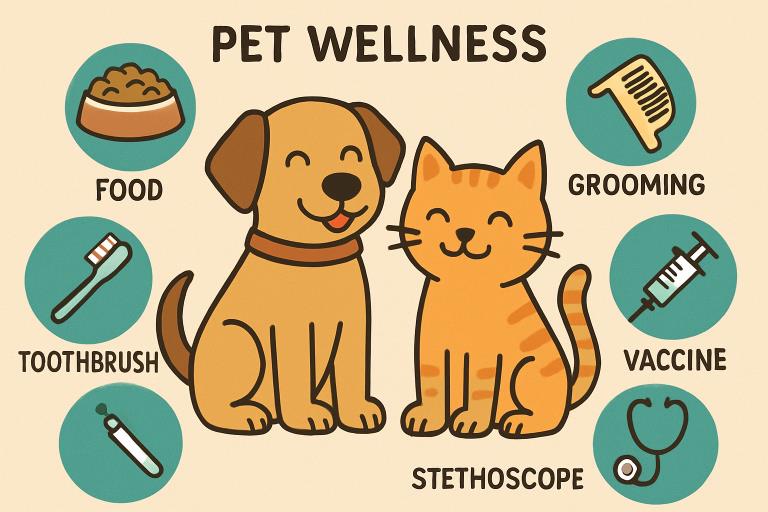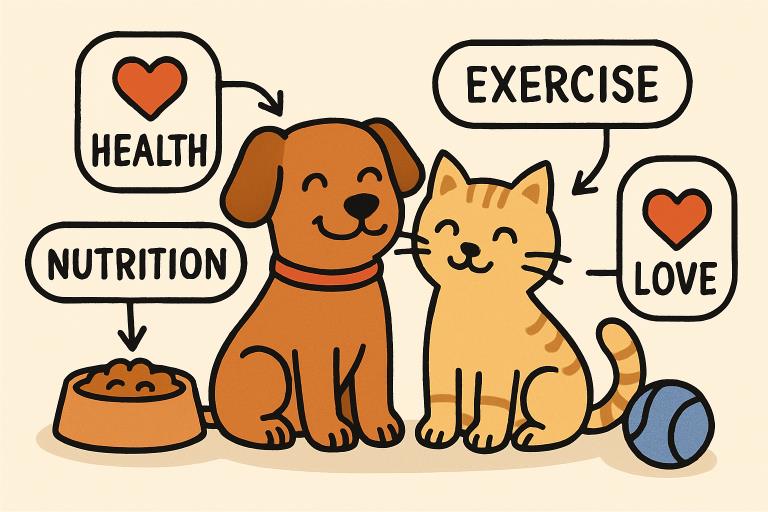Now Reading: Comprehensive Guide to Pet Wellness and Preventative Care
-
01
Comprehensive Guide to Pet Wellness and Preventative Care
Comprehensive Guide to Pet Wellness and Preventative Care

When it comes to fostering a vibrant, healthy life for your pet, there is no substitute for proactive health management. By addressing your pet’s needs before problems arise, you’ll not only save stress but protect their well-being and happiness for years to come. If you’re looking to provide the best, consider partnering with a trusted animal medical center for regular wellness checks and expert guidance. Preventative care extends beyond occasional trips to the veterinarian; it encompasses everyday habits that significantly impact your pet’s quality of life. Modern pet care emphasizes nutrition, regular exercise, hygiene, behavioral observation, and personalized health plans tailored to an individual’s age or existing medical conditions. Integrating these strategies into your routine can significantly transform the health trajectory of your beloved companion and reduce the likelihood of future health costs and complications.
Importance of Preventive Care
Pets depend on their owners to notice changes and address concerns before they become urgent. Preventative health practices—such as routine exams, vaccinations, and early screenings—can catch diseases like diabetes, dental infections, and arthritis at the earliest, most manageable stages. This approach is more than cost-effective; it offers your pet the highest chance for a long, active, and happy life.
Furthermore, many conditions common in pets become critical only when left unattended. Early detection, enabled by good habits at home and in-clinic, ensures that interventions are simple and less invasive. Owners who embrace preventative care address vulnerabilities—from genetic predispositions to weight management—well before health concerns escalate. For a deeper dive into why preventative care matters, the ASPCA general pet care guide is an excellent resource.
Regular Veterinary Check-ups
Routine veterinary visits establish a baseline for your pet’s health profile and create opportunities to track changes over time. Examinations often include weight assessment, heart and lung checks, skin and coat evaluation, and screening for contagious or hereditary conditions. Annual or bi-annual wellness exams are exceptionally vital for senior pets and breeds at risk for certain diseases. Regular appointments also enable timely updates of vaccinations, preventive medications, and dental care, tailoring a wellness plan to your individual pet’s stage of life.
Nutrition and Diet
A well-balanced diet is the foundation of robust health for animals. High-quality commercial diets provide a balanced combination of protein, fats, fiber, vitamins, and minerals. However, nutritional needs vary widely based on breed, age, activity level, and any preexisting health issues. Portion control is critical to prevent obesity, now one of the most common, preventable ailments in domestic pets. Consult a veterinarian to develop a nutrition strategy that reflects your pet’s lifestyle and changes as they age. Consider using measuring cups or kitchen scales regularly to maintain proper serving sizes and avoid giving pets table scraps, as this can disrupt their nutritional balance and digestive health.
Exercise and Mental Stimulation
Leading an active lifestyle is crucial for both the mental and physical well-being of pets. Regular exercise keeps your pet’s weight in check and supports healthy heart function, strong muscles, and sturdy bones. Activities should be tailored to your animal’s age and breed; energetic pups often need longer walks or spirited play sessions, while older or less active pets may benefit from gentler interaction.
Keeping Minds Active
Boredom in pets can quickly lead to problem behaviors, such as excessive barking or destructive chewing. Interactive toys, puzzle feeders, and introductory training sessions can stimulate your pet’s intelligence and creativity. Structured games and tasks, even for older animals, foster engagement and enrich their daily lives.
Dental Health
Ignoring dental care can have consequences far beyond bad breath. Untreated plaque or gum disease may eventually lead to chronic pain, tooth loss, or even infections that spread to the heart, kidneys, or other internal organs. Home routines such as brushing your pet’s teeth, offering dental chews, and providing special diets can help minimize plaque buildup. Regular professional cleanings, performed by your veterinarian, help detect issues early and maintain a healthy mouth. Preventive dental care is one of the most effective ways to increase a pet’s lifespan and comfort.
Vaccinations and Parasite Control
Up-to-date vaccinations are non-negotiable for pets of every age. Core vaccinations protect against life-threatening diseases, including rabies, distemper, and parvovirus. Meanwhile, parasite preventives shield your pet from fleas, ticks, and internal worms—many of which also pose risks to human family members. Your veterinarian will advise on vaccination schedules and the appropriate use of oral, topical, or injectable products tailored to your area and your pet’s exposure level.
Grooming and Hygiene
Routine grooming is about more than just keeping your pet looking its best. Brushing removes dead hair, distributes natural oils, and can alert you to problems such as skin irritations, lumps, or parasites. Most pets also benefit from regular nail trims, ear cleaning, and bath routines suited to their coat type and activity level. These practices offer comfort, reduce shedding, and play a significant role in disease prevention by maintaining the health of the skin and coat.
Monitoring Behavioral Changes
Often, the earliest indicators of illness are subtle behavioral shifts, such as changes in eating or drinking habits, sudden lethargy, hiding, aggression, or altered grooming routines. Monitoring and documenting these changes can help your veterinarian address emerging problems quickly. Many conditions, from urinary tract infections to early signs of pain or cognitive dysfunction, manifest as changes in mood or daily routines.
By incorporating wellness and prevention into your regular pet care regimen, you invest not only in fewer emergencies but also in years of joyful companionship. Consistency and attention to detail are key—your commitment ensures your pet enjoys the healthiest, happiest life possible.




















